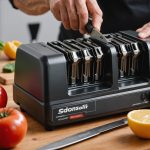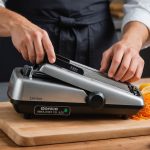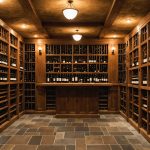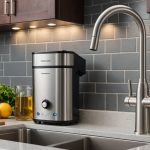The kitchen is the heart of most homes, offering a space where families gather to prepare meals, share stories, and create memories. As you labor over the stove, cooking up the perfect dish, it’s easy to forget about the silent workhorse that keeps the air in your kitchen clean — the range hood. This unassuming appliance plays a vital role in maintaining good indoor air quality by venting out smoke, cooking fumes, and airborne grease particles. But to do its job effectively, it needs the right kind of filter.
In this article, we will explore the different types of range hood filters, their advantages, and their drawbacks. Our aim is to aid you in making an informed decision about which type of filter is most effective for your range hood exhaust.
Baffle Filters
A range hood equipped with a baffle filter is designed to provide superior performance in terms of air filtration.
Also to read : How to Find a Kitchen Scale That Measures in Both Metric and Imperial Units?
Baffle filters are composed of a series of vertical stainless steel panels arranged in a zigzag pattern. When the exhaust air hits these panels, it is forced to change direction multiple times. This process causes the heavier grease particles to condense and trickle down into a collection tray, leaving the air cleaner.
One of the primary advantages of baffle filters is their durability. These filters are made of stainless steel, making them resistant to corrosion and wear. Additionally, they are dishwasher safe, which simplifies the cleaning process.
This might interest you : What Is the Best Design for a Spice Rack in a Small Kitchen?
However, baffle filters tend to be more expensive than other types of filters and they may not be as effective at capturing very fine particles. Despite these drawbacks, their high performance and longevity make baffle filters a popular choice for professional kitchens and home cooks who frequently use their range hoods.
Mesh Filters
Let’s now turn our attention to another common type of range hood filter — the mesh filter.
Mesh filters consist of multiple layers of fine aluminum or stainless steel mesh. As the exhaust air passes through these layers, grease particles get trapped in the mesh while the clean air continues its journey out of the vent.
Mesh filters are generally more affordable than baffle filters, making them an attractive option for budget-conscious households. They also have a knack for capturing smaller particles that might slip past a baffle filter.
However, mesh filters require more frequent cleaning as grease build-up can quickly clog the fine mesh, reducing the range hood’s performance. They are also more fragile and can be damaged easily during cleaning. If you opt for a mesh filter, make sure to clean it regularly and handle it with care to prolong its lifespan.
Charcoal Filters
Charcoal filters offer a unique solution for kitchens that cannot accommodate external venting, such as apartments or interior kitchens.
Charcoal filters work by adsorption; the charcoal, full of nooks and crannies, attracts and holds onto grease, odors, and other contaminants like a sponge. This type of filter is often used in conjunction with a mesh or baffle filter in recirculating range hoods (those without an external vent).
The main advantage of charcoal filters is their odor-eliminating ability. The activated charcoal neutralizes cooking odors, improving the overall air quality in your kitchen.
However, charcoal filters cannot be cleaned and reused. Over time, the charcoal becomes saturated with trapped particles and must be replaced. Depending on your cooking habits, you might need to change the filter every few months, which can increase your maintenance costs.
Electrostatic Filters
The final type of filter we’ll discuss today is the electrostatic filter.
Electrostatic filters use electricity to charge the incoming particles. These charged particles are then attracted to a series of plates or foils with an opposite charge, effectively removing them from the air.
These filters are proficient at removing very small particles, making them ideal for households with individuals who are sensitive to airborne allergens. Electrostatic filters are also washable and reusable, which can save you money on replacements.
On the downside, electrostatic filters can be more expensive upfront and they require a power source, which might complicate the installation process. Their effectiveness can also diminish over time, necessitating periodic replacement.
As you can see, the "best" filter for your range hood exhaust largely depends on your specific needs, preferences, and budget. Whether it’s the robust baffle filter, the economical mesh filter, the odor-busting charcoal filter, or the high-tech electrostatic filter, each option has its unique strengths and weaknesses. Therefore, it’s essential to consider your cooking habits, kitchen layout, and personal requirements before making a choice. Remember, a well-maintained range hood with the right type of filter can significantly improve the air quality in your kitchen and extend the life of your beloved appliance.
How to Choose the Most Effective Filter for Your Range Hood Exhaust
Choosing the most effective range hood filter involves more than just picking the one that fits your budget. You need to take into account a number of factors to ensure that the filter you choose will meet your specific needs while also performing effectively and efficiently.
Firstly, you must consider your cooking habits. If you frequently fry or sauté food, and thus generate lots of smoke and grease, a baffle or mesh filter would be a good fit. These filters are designed to handle heavy grease loads and can be cleaned regularly to maintain optimal performance. Conversely, if you have light cooking habits, an electrostatic or charcoal filter may suffice. These filters are great at removing smaller particles and odors, improving the overall air quality in your kitchen.
Secondly, the layout of your kitchen also plays a crucial role in selecting a filter. If you have the luxury of external venting, a baffle or electrostatic filter would be ideal, as they allow for exhaust air to be vented outdoors. However, if your kitchen cannot accommodate external venting, a ductless range hood equipped with a charcoal filter will be necessary. Charcoal filters excel at scrubbing the air of contaminants before recirculating it back into the kitchen.
Lastly, maintenance should also be a deciding factor. If you prefer a filter that requires less frequent cleaning, opt for a baffle filter. This durable, stainless steel filter can go longer between cleanings compared to a mesh filter. On the other hand, if you don’t mind frequent maintenance and are looking to save some cash, a mesh filter could be your best bet.
Remember, the most effective filter for your range hood exhaust is the one that best suits your cooking habits, kitchen layout, and maintenance preferences.
Conclusion
In conclusion, when it comes to choosing a filter for your range hood exhaust, there is no one-size-fits-all solution. Each type of filter — be it baffle, mesh, charcoal, or electrostatic — offers unique advantages and drawbacks.
Baffle filters are known for their durability and high performance, making them ideal for heavy-duty cooking. Mesh filters are affordable and effective at capturing smaller particles, but they require more frequent cleaning. Charcoal filters are excellent at eliminating odors and are a must-have for kitchens without the capability for external venting. Electrostatic filters, while more expensive upfront, are proficient at removing very small particles and are washable and reusable.
One must carefully consider their cooking habits, kitchen layout, and maintenance preferences when choosing a filter. Remember, the ultimate aim of a range hood filter is to ensure a cleaner, safer kitchen environment by effectively trapping airborne grease, smoke, and odors. Regardless of the type of filter you choose, it’s important to clean or replace it regularly to ensure your range hood continues to operate efficiently and effectively, keeping your kitchen air clean and your beloved appliance in top condition.











